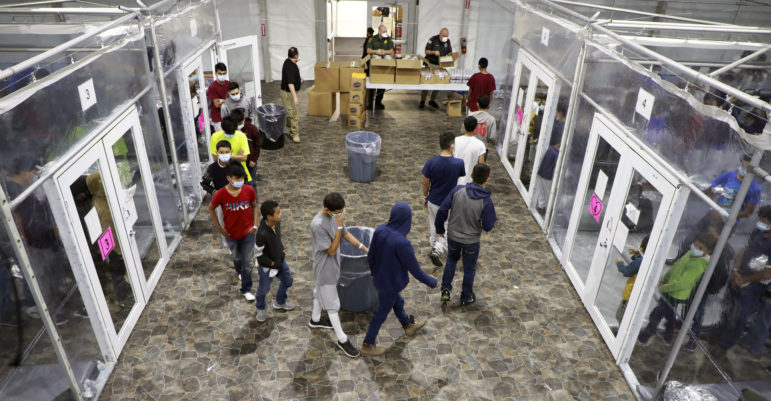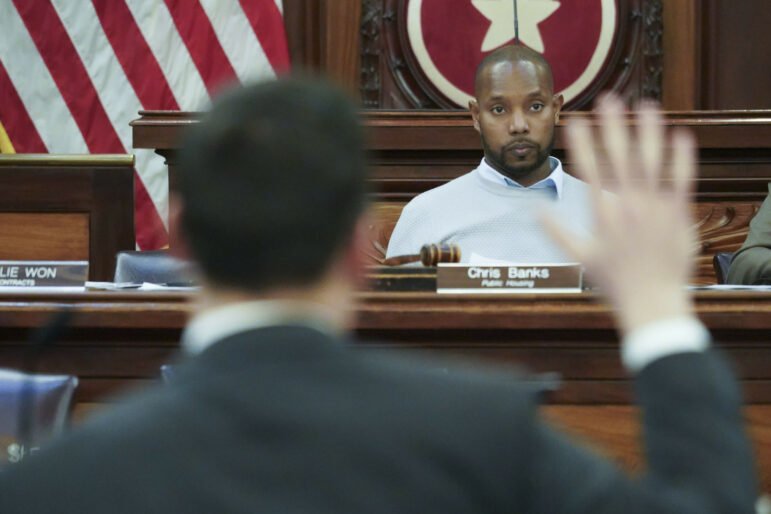Visitors to nycservice.org, the website for Mayor Bloomberg’s new community service initiative, are told “Everybody’s got something to offer.” A search by interest, skill-set, and neighborhood will bring up a host of possibilities, aimed at appealing to anyone tempted to donate some time. The website might be seen as a metaphor for Bloomberg’s strategy for swelling the ranks of city volunteers (and for accomplishing many of his goals): It works as a high-tech middleman, there to aggregate information and connect would-be participants with organizations. It presents a slick and attractive interface – but will it produce a greater number of volunteers who make a larger impact on the city?
The mayor unveiled his NYC Service Initiative at a rally hosted by MTV personality Sway Calloway on April 20. The next day, President Obama signed the Edward M. Kennedy Serve America Act into law, and Bloomberg attended the signing. NYC Service obviously intends to take advantage of an Obama effect, generating momentum for public service, as well as synergies between the two programs.
The mayor’s office is promoting the Initiative as heeding Obama’s “call to service” and as a national model. The initiative has three goals: tending to the city’s “greatest needs,” including helping low-income New Yorkers and residents battered by the recession; imparting the “value of service” to young people and students; and making New York “the easiest city in America in which to serve.” While boasting multiple plans to meet the latter two goals, it focuses on expanding, restructuring and streamlining existing volunteer infrastructure for the first. In fact, a mayoral office for the promotion of volunteering has existed for four decades.
Bloomberg plans to appoint a Chief Service Officer to oversee much of the Initiative and track its progress, including publishing updates on the website. But the criteria for success are vague. A 60-page report released with the announcement of the Initiative lists no specific numbers to be hit, only “metrics.” The metric for determining the success of the legal services program, for instance, is the “number of New Yorkers who receive legal counseling.”
Veteran advocate Joel Berg, director of the New York City Coalition Against Hunger, helped advise President Clinton in the 90s on founding the AmeriCorps program and says the anticipated expansion of the corps from 75,000 to 250,000 members meshes with the local plan – and could take a real bite out of hunger locally. “AmeriCorps national service participants, who serve full- or part-time for a year or work full-time for a summer, can … help charities fill in the food gaps for hungry Americans,” Berg said in a statement. “Such efforts achieve concrete, measurable results in neighborhoods nationwide, while building a sense of community.”
In an interview, he said a reorganization of local service opportunities could be helpful. “Why start something brand-new instead of expanding and fine-tuning something that’s worked?” he asked. But he questioned some of the Initiative’s overtones. “The idea that anyone can do service, anyone can make a difference, I challenge that. Service is not necessarily supposed to be easy. Nothing meaningful is easy. It should be easy to make a volunteer commitment, but that’s not the same as ‘easy to volunteer.'”
Berg did praise having volunteers strategically donate specific skills – like an accountant helping out at a soup kitchen. “Most of these kitchens are run by part-time volunteers with no particular accounting expertise. I got to tell you, three hours of accounting work is worth more than three hours of serving soup. If you can build a website, develop a strategic plan, design a newsletter, why should you do what your average junior high school volunteer can do? There aren’t many details in the mayor’s plan, but they have talked about redefining volunteer positions and making them more focused on concrete professional needs, and I think that is a really important advance.”
At the Citizens Committee for New York City, president Peter H. Kostmayer is excited about the additional resources NYC Service is bringing to bear on the group’s block-improvement program. This coming weekend, Kostmayer said, volunteers will spruce up one city block in Staten Island – and city services like sanitation, buildings and parks will be more coordinated than ever to help out. “You really have the city working hand in glove with the neighbors. I think it’s more involved than anything else I’ve seen,” said Kostmayer, who’s led Citizens Committee for four years.
The Initiative, he said, “marshals and mobilizes the forces of the nonprofit sector, especially at a time of financial crisis.” A survey done by Kostmayer’s organization found that the biggest reason why people were not volunteering was that they didn’t know how. Now they can find out “much more easily and directly,” he said.
NYC Service’s plans to help lower-income New Yorkers include:
NYC Civic Corps 200 AmeriCorps VISTA members will spend a year serving in the city’s nonprofits and public agencies. They will receive a monthly stipend and an education award for their service. Berg said the Civic Corps was the “most significant” aspect of the Initiative, but pointed out that the division is part of the national program. “The Civic Corps is AmeriCorps,” he said. “It’s basically re-labeling and putting a little city impetus behind AmeriCorps. It’s a wonderful thing the mayor is doing, but the infusion of funds is federal.”
Legal Aid Under Corporation Counsel Michael Cardozo, the city would multiply pro bono legal services. The Counsel’s new NYC Legal Outreach program focuses on four areas: consumer debt, foreclosures, evictions, and immigration. Like other aspects of the Initiative, it will use infrastructure already in place, like the probono.net website, to find volunteers—Cardozo said that the city will not “reinvent the wheel”. The program has planned evening briefings in May and June to mobilize lawyers – because up to 99 percent of litigants in consumer credit cases, and 95 percent in housing cases, are unrepresented, according to deputy chief administrative judge Fern Fisher. The city hopes to involve unemployed lawyers, retirees, law students, and lawyers with free time to donate.
Financial Counseling Volunteers will be trained as counselors and will staff city-run Financial Empowerment Centers. The first Center opened in the Bronx last summer; Bloomberg has announced plans to open five more this year, one in each borough. The Centers offer free “coaching” for low-income residents. They are operated by the Commission for Economic Opportunity through the Department of Consumer Affairs.
Food Bank Adoption Food Bank for New York City would connect volunteer organizations with soup kitchens and food pantries to supply goods. The Food Bank has not released details about the program; according to the Initiative report, the Food Bank would match “local businesses, schools, faith groups and other community food organizations” with food pantries. Berg, the NYCCAH director, hoped that the program would look beyond volunteerism. “I don’t know if volunteers will be able to provide that much more food,” he said. “[The report] cited a school that provided a few hundred dollars from a food drive. That’s wonderful, but it’s just a few sandwiches worth of food. We have 1.3 million people going to food kitchens and pantries.” He added that the program would work best if the adoption process was about more than supplies. “I hope when they adopt these pantries and kitchens they realize it’s not just food, it’s looking at how we can make them centers that help people get food stamps, tax benefits, nutrition outreach.”
Partnerships The Initiative invites organizations to partner with the city on additional programs. United Way of New York City has been an early joiner. CEO Gordon Campbell has announced a program to place professionals on the boards of nonprofits, and United Way will also manage the search feature on the Initiative’s website. “At United Way of NYC, we have been a tireless advocate of volunteerism and public service,” Campbell said in a statement. “It is great to be supported by an Administration that feels the same way.”








